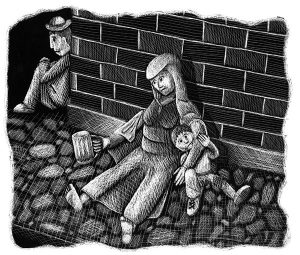A Modest Proposal for Keeping Cannibalism in Fiction
A Modest Proposal (1729) and Human Dignity
By Aleyna Su Candemir, Aslıhan Durmazoglu, Damla Sener

Despite all the differences that make us unique and idiosyncratic, we are still dependent on each other as a part of our survival due to our common home, the earth, which we inhabit collectively. We are responsible towards each other for the sake of our existence, and our actions have an impact on both the physical environment and the social life that we share. A Modest Proposal is a timeless example of a worst-case scenario that renders the grim consequences of harrowing conflicts. In the essay, Swift proposes the polar opposite of real solutions by distorting them. Distraught by wars and religious conflicts, Swift probably felt it was too late to propose optimistic solutions especially when he felt no one listened. Swift wrote on the assumption that even though we are equally responsible and interdependent, suffering is not shared equally between us. He observed that rather than adhering to common characteristics, humans choose to focus on their differences such as ethnicity, religion, culture, or social class, which results in a chain of corruption.
A Modest Proposal helps us realize the strong bond between social equality and human dignity. Swift provokes and stimulates his audience by the both horrifying and humorous example of eating the babies as a solution to the hunger crisis in Ireland and purposefully utilizes pathos by attacking the protective human instinct. Human dignity is one of the vital cornerstones of social and individual welfare as well as a necessity for social equality. In A Modest Proposal, human dignity is ignored and violated in the first instance through religious and political discrimination. British tyranny over Ireland resulted in the impoverishment of the public, trade restrictions and high rates of unemployment. Religious extremism and intolerance between Catholic and Protestant governments caused immense suffering for the public that was already weakened. Many other and more destructive violations emerge as a consequence of violating human dignity. If we consider the main reasons behind uncontrollable conflicts such as wars, we often detect intolerance and discrimination. In cases when unconditional respect for human dignity cannot be observed, social equality becomes impossible. In Swift’s time, the conflict between Britain and Ireland was caused by the infight between Protestant and Catholic governments. As a consequence of tyrannical policies and the religious oppression of the British government, Irish people suffered poverty and poor conditions in terms of basic human needs and rights. In such circumstances, the most vulnerable victims were children. The cannibalistic fiction of eating babies in Swift’s bitingly satirical proposal, which purposefully created to trigger and infuriate people, paled in comparison to reality.
From a distance in time, Swift appears to suggest that if the violation of human dignity and right to equality and freedom becomes compounded with the abuse of power, the consequences could be just as disastrous as in A Modest Proposal. The maintenance of human rights in global terms is necessary for establishing collective welfare. Human dignity must be at the heart of all ideologies and should be adopted as a principle. It is only when human rights are built on the solid basis of human dignity that dystopic worst-case scenarios such as A Modest Proposal could remain as fictions.

